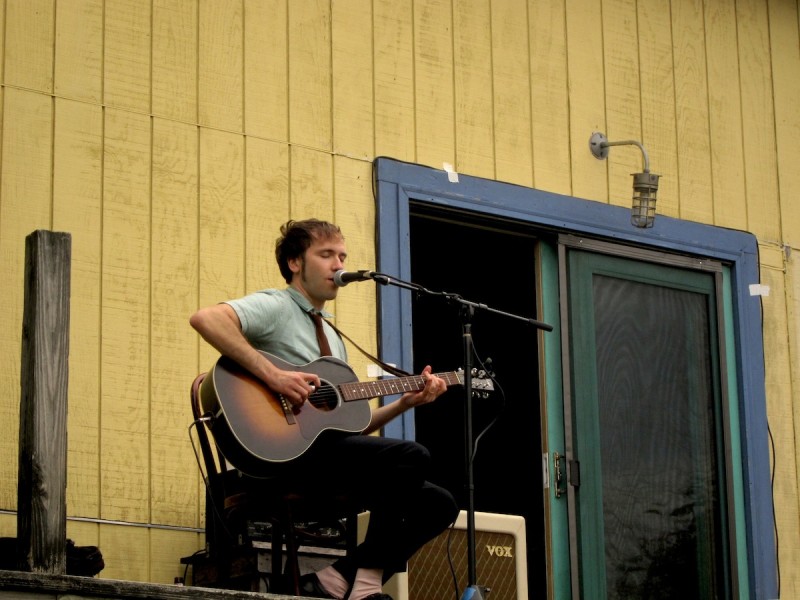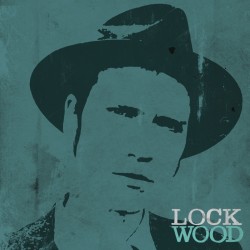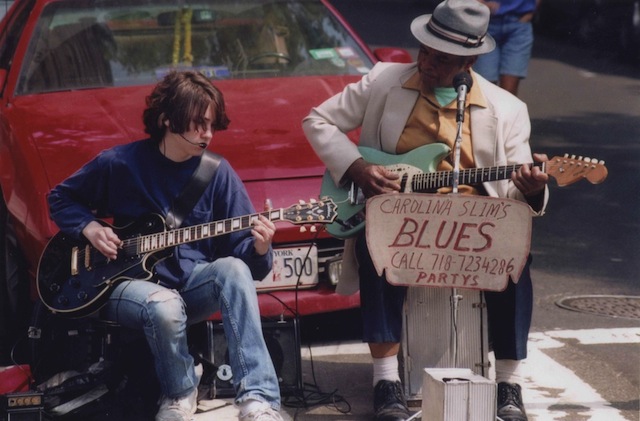
Jeremiah Lockwood at SDR’s Back Deck Fest 2013: ‘It’s very much being concerned with an aesthetic, an idea of learning as a form of meditation, by studying ancient texts or studying old music—that that’s the spiritual act, that learning, going in to yourself and this process of discovering something that’s outside the realm of the everyday. That’s where the spiritual experience lies.’

LOCKWOOD
Jeremiah Lockwood
System Dialing Records
Without overstating the case, Jeremiah Lockwood is one of the most interesting musicians on the planet. Born and raised on Manhattan’s Upper West Side, Lockwood—intense, warm, voraciously intellectually curious and a dauntingly gifted artist—is the son of composer Larry Lockwood and the grandson of the legendary Cantor Jacob Konigsberg. As his thumbnail bio at MyJewishLearning.com indicates, he “began his musical career playing his guitar and singing on the streets of Manhattan. Jeremiah has worked for years as the front man and composer for The Sway Machinery, a blues/world beat/Cantorial music ensemble.” Get that? Cantorial music ensemble? Lockwood has indeed found a way to fuse the music of his faith and heritage with secular music once (and sometimes still) derided as being the Devil’s opiate.
Long-time Lockwood followers know what a special place the blues holds in the artist’s firmament. He was but a young teenager when he would pull into Columbus Circle, set up a small amp, plug in and start wailing all kinds of blues with such authority as to draw appreciative crowds. He not only had studied the work of blues artists both great and obscure, he had found that place within himself where that work lived—when he sang, he didn’t sound like a young whippersnapper trying to sing blues he hadn’t lived; he sounded liked he had already lived those blues, and he was but a lad of 14. An old soul, you might say. Definitively so. But there was more to it than that: at his young age he become a protégé of one Carolina Slim (born Elijah Staley), a New York subway musician decades his senior, and something of a Piedmont blues legend. Slim not only schooled young Lockwood in the nuances of his musical style but impressed upon him the virtue of looking sharp, no matter whether the stage was a subway platform, a sidewalk or in a club, and of giving it your all on every song.
Lockwood and The Sway Machinery was the subject of a major feature article in this publication’s original incarnation as TheBluegrassSpecial.com, in only the third issue in fact, in June 2008. Here’s how the story, headlined No Lamentations: Jeremiah Lockwood Fuses Cantorial Music with a Big Beat and Reveals Hidden Melodies on the Road to Faith, begins:
Almost from the time he was 13 years old and an apprentice blues guitarist and singer on the streets and in the subways of New York City, Jeremiah Lockwood, now pushing 30 and about to be a father for the second time, has envisioned fusing what he has inherited in family, faith and music into a singular experience that speaks to many worlds: with songs drawn from the recorded canons of several prominent Cantors, not the least being his beloved grandfather, Cantor Jacob Konigsberg, and his twin interests in both the mysticism and philosophies of the Jewish faith as handed down through the generations, all coupled to a fairly encyclopedia knowledge of and stylistic immersion in country blues and early rock ‘n’ roll, Lockwood is taking Jewish music to places it simply hasn’t visited before, in what he views as a deeply spiritual act of restoring an ancient tradition he describes as having ben “essentially lost, or degraded” with the waning of the Cantor’s influence in the Jewish community.
His group The Sway Machinery, formed in 1996, has evolved from a hard rock trio with jazz overtones (it occasionally used a small horn section) to a basic quintet (its members have impressive resumes, having played with indie rock favorites such as Antibalas, Balkan Beat Box, the Yeah Yeah Yeahs, and unconventional, unclassifiable musicians such as Tom Waits, et al.) that challenges-nay, defies—a listener to pinpoint the multitude of sources informing its music. Middle Eastern and, now, Afro-beat stylings are predominant features of the Sway Machinery soundscape, but right smack in the middle of a clanging, raucous workout, whoa! There’s Lockwood injecting a spitfire, hard-picked run on his Telecaster that comes right out of the Scotty Moore playbook, circa Memphis 1954; or the blurting, blaring horns offering a sly, sweet riff that also hearkens to Memphis, but rather to the Memphis Horns of the late ’60s-early ’70s Stax Records juggernaut across town from the Sun Studio from whence a revolution began a decade earlier. To some it might sound like clatter, or free jazz, but sticking with it reveals a compelling symmetry in the instrumental give-and-take, the casual appropriation of sources Eastern and Western that lend the sound a distinctive sweet and pungent flavor; and riding over it all, Lockwood’s jittery, dramatic, resonant baritone vocals, oftentimes singing lyrics in Yiddish but rendering them accessible in the context of the total presentation. In short, you may not understand what he’s singing from a literal standpoint, but the music’s energy and Lockwood’s emotional commitment makes a statement that obviates the need for translation.
As I said, in so many words: this guy is something else. At that time he had one solo album out, American Primitive, but then The Sway Machinery found its groove and began touring nationally and in Europe; in January 2010 the group traveled to Mali to perform at the Festival of the Desert; two years later they were really going global, appearing in Australia, Israel, Warsaw, at the Montreal Jazz Festival, and at Roskilde in Denmark. In addition, Lockwood has been writing and polishing an ambitious work he’s titled “Hidden Melodies Revealed,” based on the music of the great Cantors his own grandfather introduced him to long ago. As he writes on the Sway Machinery website: “The Sway Machinery is currently at work on a project that seeks to reclaim the deep roots of Ashkenazic Jewish spiritual music. It is my belief that in the work of the master Chazzans of the Golden Age of Cantorial music there is a model for creative work that can be usefully employed today. In the Cantor’s balance of artistic authority and spiritual humility I see a perfect stance from which to speak to the emotional needs of the contemporary world. Together with my colleagues, I am revisiting the work of my heroes of Chazzanus, particularly the music of my grandfather, the legendary Cantor Jacob Konigsberg. In this way I am hoping to return to that place of childlike awe that he opened to me and share it with the world.”
At the moment Jeremiah Lockwood is on his way to being Dr. Lockwood, having been accepted for Stanford University’s PhD program in Jewish studies/ethnomusicology. While he toils away at his doctorate on the west coast, he’s back with a solo album, titled simply Lockwood, that returns him to the genesis of Jeremiah Lockwood, if you will, as a powerful acoustic blues artist. The only tune among its 14 that hints at his Sway Machinery incarnation is a sparkling, eerie rendition of “Soundiata” by the towering Mali singer-songwriter Boubacar Traoré that sounds, in its wordless, driven chanting, like a cross between the worlds of Mali, Israel and Native Americans—make that “a bridge” between the worlds of…in true Sway Machinery fashion. The rest of it, however, plumbs the roots of at least a couple of branches of The Sway Machinery’s, as well as Lockwood’s, roots.
For starters, there’s the folk blues of Elizabeth Cotten. No, Lockwood doesn’t give us another rendition of the wonderful “Freight Train,” but instead offers three other wonderful Cotten songs, one kicking off the album and two others blended into a melody nine songs in. The opening cut, “Babe It Ain’t No Lie,” is a tune Cotten wrote in her youth after a caretaker lady told little Elizabeth’s mother about some of the girl’s misdeeds, none of which were true. Cotten sings it with a bit of a jaunty air—she actually sang it for the caretaker lady and got a kick out of the latter not knowing who it was about–but Lockwood sounds frightfully wounded in taking it at a bit slower tempo, although he retains the Cotten arrangement’s delightful syncopation. As he does here, and so often on this album, he finds the point where lyrics can be shaded just so to achieve emotional resonance in the most unexpected places, and yet remains true to the original recordings’ structure and style. “Babe It Ain’t No Lie” signals as well the degree to which Lockwood has matured as a vocalist. Not only is his voice deep, rich and full now, he’s become a fearless, idiosyncratic stylist who’s mastered the art of pauses, whispers and, for lack of a better term, vocal exclamation points when warranted. Listen to the way he softly clips the word “oh” when he sings “oh, babe it ain’t no lie”—the hurt is right on the surface, near palpable and indicative of how personal he’s made the song. One of many interesting facets of his Elizabeth Cotten fixation here is that the three songs he includes are the last three tracks from her first album, Freight Train and Other North Carolina Folk Songs and Tunes (as it’s known in its complete reissue by Smithsonian Folkways). There’s likely not much to make of that, but still… The other two Cotten numbers are found in the medley combining her gentle rendition of an old parlor guitar piece she titled (or re-titled) “Spanish Flangdang” (others refer to it as “Spanish Two-Step”), wherein Lockwood’s ruminative steel string picking (note a weird, out-of-nowhere bent note at the one-minute mark that momentarily but by design disturbs the melody’s graceful flow) conjures a pastoral atmosphere from which emerges an understated but determined reading of her forthright salvation song, “When I Get Home”—a seemingly unlikely pairing of the sort common to John Fahey, which gives you an idea of the turf Lockwood is working.
Whereas this homage to Ms. Cotten is along the lines of thoughtful and lyrical, back-to-back renditions of Rev. Gary Davis tunes are fire and brimstone treatise—Lockwood’s ferocity in attacking “God’s Gonna Separate the Wheat from The Chaff” burns with righteous, rather than blessed, assurance of the big man’s pitiless requirements for admission to His kingdom, with Lockwood’s fierce vocal and florid finger picking in lockstep with the song’s message; the Rev’s “Twelve Gates,” by contrast, is a vision of a Heaven inspired by the Book of Revelations and Lockwood captures all that intensity of the expected arrival in Gloryland in his assured vocal and aggressive guitar support.
By now the point should be made that Lockwood has put an indelible imprint on these great songs from antiquity but sounding right on time for the times. He doesn’t have Big Bill Broonzy’s stout voice, but his take on “How You Want Your Rolling Done” is no less authoritative (or tastefully salacious) as he leaves it to the cascading, rolling notes emanating from his fleetly picked guitar to speak for his unquenched libido; from the dark heart of Mississippi comes the haunting Bentonia-style blues of Skip James via the dirge-like “Hard Times Killing Floor Blues,” complete with a high, wounded Skip vocal attack that will hit you where you live. And amidst other stellar explorations of work by Charley Patton (a rollicking “Spoonful”), Mississippi John Hurt (a lowdown, wounded “Don’t Want Me Baby”) and a couple of rousing traditional blues driven by sprightly fingerpicking (“Honey Baby” and “Catfish Blues”), Lockwood introduces two of his original tunes: “Hurting,” a laconic, sly blues far darker lyrically than its sunny fingerpicked accompaniment would suggest; and an anxiety-riddled treatise on physical and metaphysical stasis, “Cold Comfort,” a stark, doom-laden workout fueled equally by Lockwood’s howling vocal and a guitar arrangement alternating a jittery, nervous fingerpicked roll with softly strummed chords. Perhaps the highest compliment is this: if you didn’t look at the songwriter credits, you’d swear the Lockwood originals must have originated with some obscure Delta bluesman of long, long ago. An old soul he is, to be sure.
SELECTED TRACK: ‘Cold Comfort,’ a Jeremiah Lockwood original from Lockwood
During that 2008 interview quoted from at the outset, Lockwood and I discussed his study of the Talmud and other Jewish texts. I asked if he dove into these texts I pursuit of wisdom, or of spiritual guidance. His answer then strikes me now as the animating impulse of this wondrous album he titles simply, with his surname. To wit:
“It’s very much being concerned with an aesthetic, an idea of learning as a form of meditation, by studying ancient texts or studying old music—that that’s the spiritual act, that learning, going in to yourself and this process of discovering something that’s outside the realm of the everyday. That’s where the spiritual experience lies. Obviously then it blossoms in the moments of experience when you’re singing the music, and you experience it in a different way. But for me, when I think about religion I think it means a hermetic, inward, very intellectual experience of going into yourself, and getting to this place through something that seems like it’s not necessarily spiritual; maybe it’s more in the head, but this process gets you to something which is hidden, it’s underneath.”
Lockwood and its author are the real deal. Behold.




